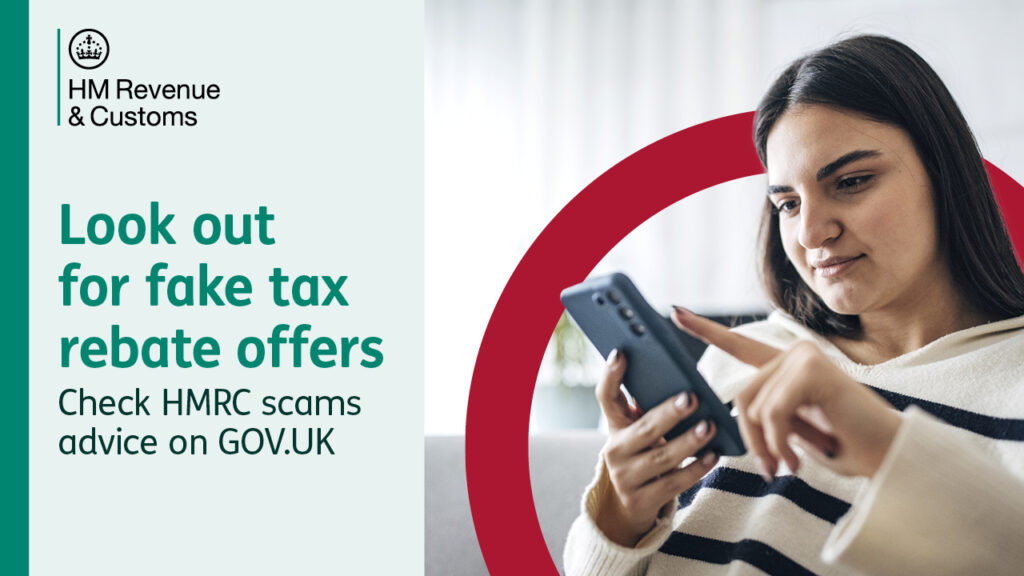With the Self Assessment tax deadline behind us, HM Revenue and Customs (HMRC) is warning people to be wary of bogus tax refund offers.
Fraudsters could set their sights on Self Assessment customers, with more than 11.5 million submitting a tax return by last month’s deadline.
Taxpayers who completed their tax return for the 2022 to 2023 tax year by the 31 January deadline might be taken in by an email, phone call or text message offering a tax rebate. These phishing scams are designed to use personal details for selling on to criminals, or to access people’s bank accounts.
HMRC responded to 207,800 referrals from the public of suspicious contact in the past year to January – up 14% from the 181,873 reported for the previous 12 months. More than 79,000 of those referrals offered bogus tax rebates.
Kelly Paterson, HMRC’s Chief Security Officer, said:
“With the deadline for tax returns behind us, criminals will now try to trick people with fake offers of tax rebates.
“Scammers will attempt to dupe people by email, phone or texts that mimic government messages to make them appear authentic.
“Don’t rush into anything, take your time and check HMRC scams advice on GOV.UK.”
HMRC will not email, text or phone a customer to tell them that they are due a refund or ask them to request a refund. Customers receive repayments into their chosen bank account, and can see any transactions in their online HMRC account and in the HMRC app.
Customers can help fight phishing scams by reporting any suspicious communications to HMRC:
- forward emails to phishing@hmrc.gov.uk
- report tax scam phone calls to HMRC on GOV.UK
- forward suspicious texts claiming to be from HMRC to 60599
In the last year to January HMRC also reported 26,443 malicious web pages to internet service providers to be taken down. This is a 29% increase from the 20,385 referred by HMRC for removal the previous year. These sites aim to deceive taxpayers and steal their personal information or money.
They copy the design and branding of genuine websites so criminals can trick people into giving away their personal details. This information is then used to access people’s bank accounts or sold on the web.
HMRC is reminding customers to be vigilant to any potential scam activity, protect their personal information and report any suspicious activity.
Notes to Editors
1. Remember to
Protect
- Criminals are cunning – protect your information.
- Take a moment to think before parting with your money or information.
- Use strong and different passwords on all your accounts so criminals are less able to target you.
Recognise
- If a phone call, text or email is suspicious or unexpected, don’t give out private information or reply, and don’t download attachments or click on links.
- Check on GOV.UK that the contact is genuinely from HMRC.
- Do not trust caller ID on phones. Numbers can be spoofed.
Report
- If you’re unsure about a text claiming to be from HMRC forward it to 60599, or an email to phishing@hmrc.gov.uk. Report a tax scam phone call on GOV.UK.
- Contact your bank immediately if you’ve had money stolen, and report it to Action Fraud. In Scotland, contact the police on 101.
- By reporting phishing emails, you help stop criminal activity and prevent other people falling victim.
2. On Monday, the Home Office launched its national campaign ‘Stop! Think Fraud’. Backed by organisations across law enforcement, tech, banking, telecoms and the third sector, a new website was created with advice on how to stay safe online. It can be found at www.gov.uk/stopthinkfraud
3. More information about Self Assessment
4. The Self Assessment payment deadline was 31 January, and anyone with outstanding tax to pay should do so as soon as possible. There are many ways to pay, including online, using the HMRC app, by bank transfer, or setting up a Time to Pay payment plan.
5. A full list of payment options can be found on GOV.UK. There is also a video on YouTube that explains a customer’s Self Assessment tax bill and the different ways to pay.
6. Taxpayers who file or pay late but have a reasonable excuse can appeal penalties on GOV.UK. HMRC has published interactive guidance to explain the process and signpost them to the correct course of action.
7. Follow HMRC’s Press Office on Twitter @HMRCpressoffice
Related links
- Identify tax scam phone calls, emails and text messages
- Check a list of genuine HMRC contacts
- Report suspicious HMRC emails, text messages and phone calls
- Action Fraud
- Stop! Think Fraud
- Self Assessment tax returns
- If you cannot pay your tax bill on time
- Self Assessment tax returns – penalties
- Check when to appeal a Self Assessment penalty for late filing or late payment


